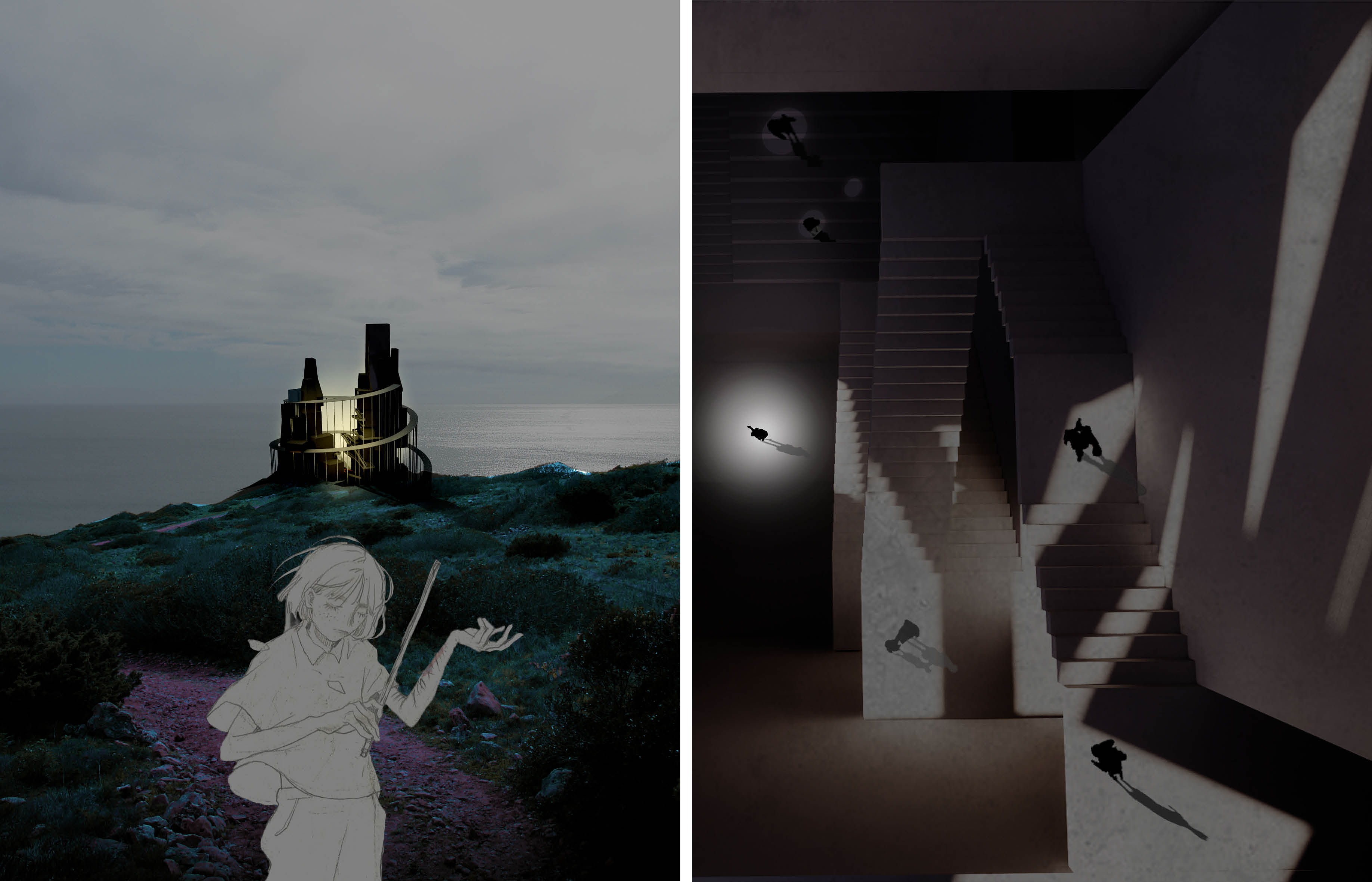30 Nov 2021
"Twisted City", a Final Year Project from Xi Chen who just graduated from Xi’an Jiaotong-Liverpool University’s architecture undergraduate programme, is a nominated entry for the Bronze Medal by Royal Institute of British Architects (RIBA) President’s Medals.
RIBA President’s Medals were originally established in 1836 and are regarded as the most prestigious prizes in architectural education globally. In 1986, they were separated into the Bronze and Silver Medals, rewarding outstanding design work at RIBA Part 1 (undergraduate) and Part 2 (masters) respectively.
In her project, Chen designed a music concert hall located on the silent west coast of Portugal. It is intended to serve as a warning against being “entertained to death” through its radical style and dark atmosphere of the design.

Inspiration from post-punk
Chen was originally inspired by the song Pigs in the River, a piece of post-punk music from a Chinese band named Re-TROS.
“In the song title, ‘pig’ refers to people who are controlled by entertainment, and the ‘river’ refers to the current society full of fast-food information,” explains Chen. “In the music video, the band members drive a car to escape a twisted city, only to discover that they’re in fact members of this city and cannot escape.
 “This design combines the complexity of human emotion, the coldness of the machine and the visualisation of architecture extracted from experimental music. I want to explore a new architectural language and a way to express architects’ attitude towards the world,” she says.
“This design combines the complexity of human emotion, the coldness of the machine and the visualisation of architecture extracted from experimental music. I want to explore a new architectural language and a way to express architects’ attitude towards the world,” she says.
Imagery from the Tower of Babel
In the Bible, the Tower of Babel, a failed utopia, was originally meant as an ideal world but was destroyed in the struggle for power. It was adopted by Chen as the main element of her design.

“The main reason for its failure was the lack of communication, and it was used as a tool in a power struggle,” Chen says. “To me, this is consistent with the social reality that people are addicted to entertainment while being secluded from the real world in the flow of constant information.
“While adopting the Tower of Babel as the body, my design uses stacked blocks for each independent space, reflecting the disorder of fragmented information,” she explains.
Warning against excessive entertainment
Located at the centre of the architecture is the concert hall where musicians can perform, which is named the Abyss due to the depth of its space. It is connected to other functional areas such as music classrooms, a music lab, an exhibition hall, a meditation space, a library, and a sunken garden by different paths.
“In the concert hall, musicians perform at the bottom of the space while audiences watch from above,” Chen explains. “I want to create a radical architecture style that reflects the artist’s loneliness.”

Chen selected the west coast of Portugal because it is known as “the end of the world”, and her design, like a lighthouse on the top of the cliff, gives a warning effect.
“Many people nowadays are addicted to electronic devices. They’re happy to accept short, shallow bits of information, and are easily influenced by public opinions,” Chen says. “I hope to tell people the danger of excessive addiction to entertainment – are we really going to be ruined by the things we love?”

Commenting on Chen’s project, her supervisor, Dr Juan Carlos Dall’Asta, says that Twisted City is highly speculative and displays her criticism towards contemporary society.
“Her design is very philosophical, with high social understanding,” he says. “It’s the kind of design that is able to go beyond the boundaries of traditional design.
“Being nominated for a RIBA President’s Medal is not only a great honour for the student and our department, but is also important for future evaluations from RIBA since we’re accredited by them,” he says.
“It’s a way of communicating with the world about what our students can do, and to build more connection with some of the top institutions and universities in the architecture field,” he adds.
XJTLU is the first university in Chinese mainland to gain unconditional Part 1 and Part 2 international validation from RIBA for its undergraduate and masters architecture programmes.
By Yi Qian
Edited by Patricia Pieterse
Images provided by Xi Chen
30 Nov 2021








